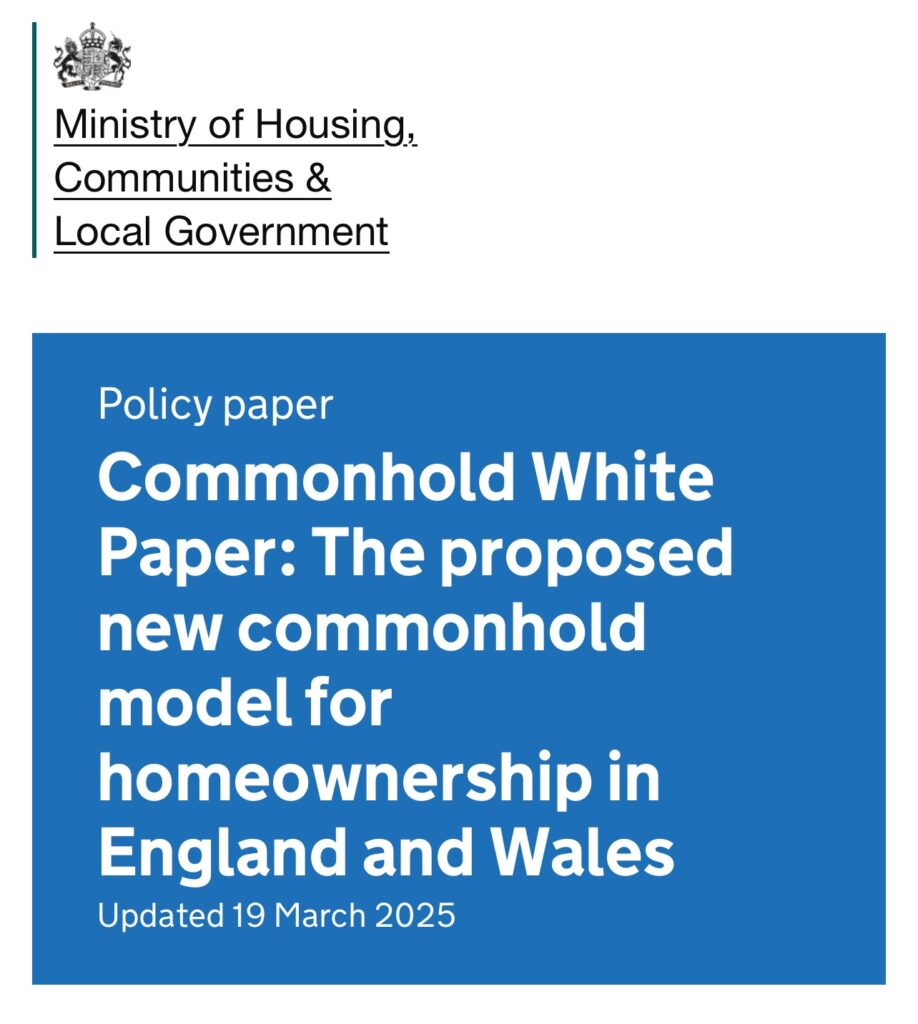
On Monday 3 March, the Government published its much-anticipated Commonhold White Paper and announced plans to end the sale of new leasehold flats by the end of this Parliament, i.e. by 2029.

Launching the White Paper, Housing Minister Matthew Pennycook MP said the changes “will ensure flat owners are not second-class homeowners and that the unfair feudal leasehold system is brought to an end.”
Initially introduced in England and Wales by the Commonhold and Leasehold Reform Act 2002, Commonhold has since struggled to make inroads into the UK property market, largely due to flaws in its legal framework. However, it is a successful form of tenure elsewhere in the world with similar models to be found in Australia and New Zealand, the U.S. and other common law jurisdictions.
Labour’s election manifesto committed to supporting the delivery of a Commonhold system, and the government has said that it intends to push forward the majority of the Law Commission’s recommendations “due to the benefits of this tenure over leasehold”.
Much can be said about about whether leasehold is in fact feudal (it is certainly not in the strict legal sense, however the government and many campaigners have chosen to characterise it as such as a metaphor for their frustrations and experiences at the hands of bad landlords or managers under the current system. That being said it is the only system that we currently have and on which see my comments at the end of this note.
What is proposed?
The proposed rules will only apply to new flats, not houses, and therefore will not change the ownership structure for existing leaseholders. As such, there is no suggestion that existing leasehold properties will automatically transfer to commonhold tenure, and conversion will not be straightforward. In practical terms, those who have bought flats as leasehold properties will find that these remain as leasehold properties and will only be capable of being converted to commonhold if all the flat owners and the freehold owner agree. An alternative route may be if in the future the law is reformed so that a collective enfranchisement will lead to the building being converted to a commonhold.
What is wrong with the current version of Commonhold?
The White Paper is only the first step in a journey to the implementation of a working Commonhold system. There are numerous known issues with the current version of Commonhold which need to be resolved before it can be made ‘fit for purpose.’
Whilst these are all reasonably technical challenges, examples include: what happens when and if a Commonhold company becomes insolvent, the inflexibility in the current model as relates to management charges and concerns for developers in terms of the handover requirements that apply when more than half of the units are sold.
In addition, lenders do not like the current provisions that would allow a vote of 80% of the unit owners to bring the Commonhold to an end.
The work that is needed to reform various other aspects should not be underestimated and currently there is no legislation on Commonhold before parliament – although the White Paper lays the path for the proposed new Commonhold and Leasehold Reform Bill, which is likely to be a very large piece of legislation and by Mr Pennycook’s own estimation may require two Bills and in fact stretch beyond the current session of parliament.
So what exactly is Commonhold?
Commonhold is a form of property ownership in England and Wales that allows homeowners to own their individual flats or units while collectively managing shared areas, such as hallways and gardens and the main structure the building. This is done through membership of a company called a ‘Commonhold Association’ comprised of the unit holders, which is responsible for managing and maintaining the structure of the building. The flats are freehold units and there is a single document ‘the Commonhold Community Statement’ which sets out the obligations to for repair and ownership boundaries.
Technically, this gives flat owners more control over maintenance and costs-based decision-making as there is no external freeholder or landlord.
What are the pros and cons of this system?
Whilst collective management gives flat owners greater control, there is no one else involved in the decision-making process, and this can have drawbacks. For instance, if a large number of the apartment owners are reluctant to spend on necessary maintenance, this can lead to issues of longer-term disrepair and lack of proper investment.
One of the other proposed reforms from the White Paper is the recommendation that for developments of any size and scale that a managing agent must be appointed to the company board. In my view this is pretty much essential to ensure prudent and appropriate management decisions are taken with a view to maintaining long term value in the property. There are many examples of self-managed buildings where neglect has set in and there has been an unwillingness to spend appropriately on maintenance which can then lead to much bigger problems, particularly where matters such as fire safety are concerned. I do not see these issues as going away simply because there is a new form of tenure.
In short there are likely to be pros and cons with any system and it would be foolish in my view to believe that Commonhold will automatically ‘cure’ these issues.
What about leasehold?
My personal view is that leasehold should not be seen as a ‘second-class’ form of tenure and is in fact a workable system and has much to commend it. The unfortunate truth is that in many instances management is less good than it should be and in some cases borders on the exploitative. In these cases taking action to buy the freehold or exercise the Right to Manage are likely to be of assistance.
However, not all freeholders are determined to be ‘bad’ landlords and whilst there is a lack of control where there is third party ownership of the freehold there is then at least someone who can be called upon to ‘police’ the lease covenants and is duty bound to act even handedly across the whole development. Ultimately however, most apartment owners would rather have the freehold in their ownership or have a stake in this through a share in the company that owns the freehold.
Are all leasehold flats bad?
Currently the only kind of flat or apartment you can buy is one that is leasehold. Increasingly, developers are starting to offer shares in a company that owns the freehold and 999-year lease which will be at a nil rent following the Leasehold Reform (Ground Rent) Act 2022, which banned ground rent for all new leases.
Whether or not the government manages to realise its vision to replace leasehold with commonhold, there will be leasehold properties for many years to come, even if a ban on new leasehold flats comes into force. We therefore need to be careful not to ‘talk down’ leasehold as an asset class, particularly given that this is the way in which around 5.6 million people currently own their home.
Where there are issues, leaseholders have rights, including the right to take service charges to the tribunal as well as the possibility of exercising the right to manage or buying the freehold. As matters stand in Commonhold once the ‘commonhold community assessment’ (the equivalent of the service charge) is set there are no grounds for challenge. The White Paper recognises the need to extend the tribunal’s jurisdiction to this.
No doubt not having a landlord may well be many people’s preference, but what has to be borne in mind in Commonhold is that it is then only the unit owners bound together who must deal with all of the liabilities and responsibilities that go with management. This is a fundamental shift of mind set and in other jurisdictions the Commonhold Association often has unlimited liability in recognition that the decisions that it takes and legal commitments that it makes under contracts etc are in fact binding on the apartment owners without limit. I do wonder if the national psyche is quite ready for this adjustment as with Commonhold there will certainly be no ‘nanny state’ or indeed third party ‘bogeyman’ that can be blamed for the ills arising whatever these may be.
Where next for Commonhold?
The publication of the Commonhold White Paper is to be very much welcomed as we now have a clearer idea of the Government’s intentions, which appear to be to implement more or less all of the Law Commission’s recommendations.
However, there are a fairly large number of challenges that need to be overcome before a Commonhold system can be brought into force. I and other practitioners are happy to assist in the discussions around this and I would hope that in the consultations that are to come around the Commonhold and Leasehold Reform Bill when it is published and debated that the views of those working at the ‘sharp end’ of the legislation are taken into account to ensure that any change is meaningful and effective.
In terms of timing, the promise of ‘by the end of this parliament’ seems ambitious, however, what we might see perhaps is the promise of a date in the future by which all new apartments will have to be Commonhold, even if that date falls after that time, with the promise of enabling legislation to bring this about.
Mark Chick
24th March 2025